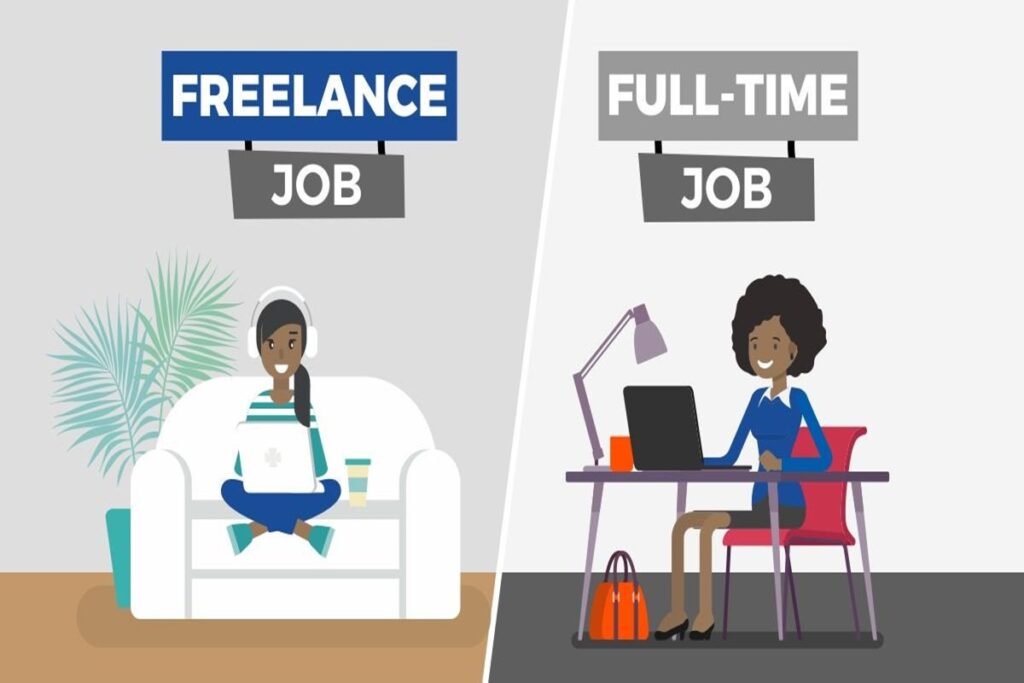Key Takeaways:
- Freelancers enjoy flexibility but face income instability.
- Full-time employees have job security and benefits but less autonomy.
- Both paths offer valuable experiences that can benefit your career.
- Understanding your personal goals can help you choose the right path.
- Networking is crucial, regardless of your employment status.
Full-Time Freelancer vs Full-Time Employee: Which One is Better? – Choosing between being a full-time freelancer and a full-time employee is a significant decision for many people. Each path has its own set of advantages and challenges. In this blog post, we’ll explore the key differences between being a freelancer and an employee, helping you understand which option might be better for you. We’ll break down the essential aspects of each role, from job security to flexibility, to give you a clear picture of what to expect.
One of the main attractions of freelancing is the freedom it provides. As a freelancer, you can choose your clients, set your hours, and work from anywhere. This flexibility allows you to create a work-life balance that suits your lifestyle.
Imagine waking up and deciding where to work that day. You might prefer a cozy café, a sunny park, or the comfort of your home office. This freedom is particularly appealing for those who value autonomy and want to break free from the traditional 9-to-5 grind.
However, freelancing also comes with challenges. The income can be unpredictable, especially when starting. Some months may bring in plenty of work, while others may leave you scrambling to pay bills. It’s essential to have a financial cushion and a solid client base to ensure stability.
If you’re interested in exploring more about the world of freelancing, subscribe to our blog for tips and insights!
On the other side, full-time employment offers stability. As an employee, you typically receive a consistent paycheck, benefits like health insurance, and paid time off. This predictability can provide peace of mind, especially if you have financial obligations like rent or a mortgage.
For many people, knowing they have a reliable income every month is worth the trade-off of less flexibility. Employees often find comfort in structured work environments, where they can focus on their tasks without worrying about finding new clients.
However, being an employee can also feel limiting. You might have to stick to a strict schedule and follow company policies, which can sometimes stifle creativity. Additionally, career advancement may require navigating office politics or waiting for opportunities to open up.
Regardless of whether you choose freelancing or full-time employment, both paths offer valuable skills. Freelancers often develop strong networking abilities, marketing skills, and adaptability as they promote themselves and manage different clients. This experience can be beneficial if you decide to transition into a full-time role later.
On the flip side, full-time employees often receive training and professional development opportunities that freelancers may miss out on. Working within a team allows employees to learn from experienced colleagues and gain insights into industry trends. Both routes provide unique chances to grow and evolve in your career.
Networking plays a crucial role in both freelancing and full-time employment. For freelancers, building a solid network can lead to referrals and new clients. Attending industry events, joining online communities, and leveraging social media can help freelancers connect with potential clients and collaborators.
For full-time employees, networking can lead to career advancement opportunities. Building relationships with colleagues, mentors, and industry professionals can open doors to promotions or new job offers. Whether freelancing or working full-time, nurturing these connections is essential for long-term success.
Practical Tips for Success:
- Set Clear Goals: Whether freelancing or working full-time, define what success looks like for you. This clarity will guide your decisions and help you stay focused.
- Financial Planning: Freelancers should save for slow months, while employees should budget for unexpected expenses. Understanding your financial situation is crucial for both paths.
- Stay Organized: Use tools like calendars and task management apps to keep track of deadlines and meetings. This habit will benefit you in either role.
- Invest in Learning: Continuously seek professional development opportunities. Online courses, workshops, and networking events can help you stay competitive.
- Balance Work and Life: Prioritize self-care, regardless of your employment status. Taking breaks, exercising, and pursuing hobbies are essential for maintaining mental health.
In the debate of Full-Time Freelancer vs Full-Time Employee: Which One is Better?, there is no one-size-fits-all answer. Each path has its pros and cons, and the best choice depends on your personal goals, lifestyle preferences, and financial needs. Freelancers enjoy flexibility and independence, while employees benefit from stability and structured environments.
As you consider your options, remember that both paths can lead to fulfilling careers. Embrace the opportunities each provides, and don’t be afraid to switch paths if your circumstances change. Whether you choose to freelance or work full-time, focus on your growth and the experiences you gain along the way.
We’d love to hear your thoughts! Have you experienced the differences between freelancing and full-time employment? Share your experiences and insights in the comments below!





